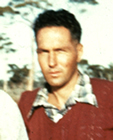
Dr Robert McKeich is one of the few non-indigenous men to hold the honour of being initiated into an aboriginal tribe. But then, he was a remarkable man, who had a genuine love and respect for the indigenous Australian people, a deep interest in their wellbeing, and was prepared to learn from the Aborigines, not only with his perceptive mind, but with his whole being.
Robert was born in New Zealand on July 10, 1923 to Ernest Gordon and Gladys Helen McKeich. He had one brother, Gordon, who preceded him in death and one sister, Loris West and her husband Harold, living in Auckland, New Zealand, who survive him.
He started life in humble circumstances and lived simply (by western standards) all of his life.

Robert served in the NZ Army and the Royal NZ Air Force during WWII.
He married his first wife, Elizabeth Green, in 1944. They had four children, John, Miriam, Paul and Julie Ann. From 1945 to 1953 Rob taught elementary school children in Auckland and took on a key project of personally building a family home. He was deeply involved in church work, serving as a Sunday School Superintendent, teaching Bible classes and conducting prison visitation, beach and open air missions. Later, in Perth, he also taught courses in two theological colleges.
In 1954, with his family, he migrated to Australia to pioneer the first State Government School for Aborigines at the Cundeelee Mission Station in the Western Desert area of Western Australia. There, under primitive conditions, in a one-room classroom, in an unlined Quonset hut, and with the assistance of Betty, he taught 28 pupils, most being Aboriginal children ranging in ages from 4 to 16 years and some of whom spoke only their tribal language, Wangkayi. He studied and learned their language.

At this time in Aboriginal history, the State Education Department’s objective of assimilation of Aboriginal children into “white” society was in full implementation and Robert’s commitment to Christianity provided him with a zeal to not only educate but to lead the Aborigines to that Christian understanding.
Gradually, Robert grew to understand and love the culture and loving spirit of the Aboriginal people, their relationships with each other, their lore and law, their physical connection to all of Nature and their deep spiritual connection to all things, beyond time and space . . .‘Everywhen’. As, over time, he recognized the disruption and fragmentation of their rich and beautiful society caused by the white man’s intervention, the Aborigines’ trust in Robert grew to a level of integration rarely seen in the interaction between the two societies. He began to question the wisdom of the governmental assimilation policy at Cundeelee.
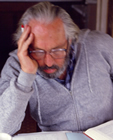
With growing dissatisfaction at being involved in the assimilation program of Aboriginal children, 1958 produced an important change. A move to Perth, Western Australia resulted in Bob and Betty pioneering a hostel, which was named Katukutu, meaning “To the Top”, for Aboriginal young men who had left their tribal locations to work in the city. In addition, and in order to finance the hostel and his family, for six years, Rob worked full time as an Elementary School teacher, helped to manage the hostel and, at the same time, he began his undergraduate studies at the University of Western Australia, majoring in Anthropology and Psychology.
From 1967 until 1983 when at age sixty he retired from full time teaching, Robert lectured in Anthropology, at the Western Australian Institute of Technology, later named Curtin University of Technology, in Perth.

During this period in his life, Robert maintained his relationship with the people of Cundeelee through return visits to the desert. During university vacations, he often took groups of his students to spend a week, living in the camp, and thus provided an opportunity to his tribal people, to reverse roles and teach the white students.
In 1971 Robert graduated with a Ph.D. degree in Anthropology at the University of Western Australia and in 1975 was physically initiated into the Wangkayi Aboriginal tribe at Cundeelee.
A teaching exchange to Oklahoma Baptist University (OBU) in 1972-73 brought major changes in his life. There, his world view was enlarged through studies in Sociology, including Death and Dying, Marriage and the Family, and to his great delight, the Pueblo Indian people.
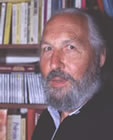
Returning to Australia, the marriage of Robert’s youth was not able to sustain the broadening horizons, the deeper engagement with life and the more mystical understanding of faith and spirituality that were contouring Robert’s life. The marriage ended in 1976.
Robert began keeping a detailed journal of his activities and adventures in 1977, a habit which he maintained for the rest of his life. He donated his journals to the West Australian Battye Library to be used by future researchers. The journals provide a wealth of insights, wisdom and knowledge that is only available from someone who has the deep, integrated experience from within indigenous culture and a love for the discovery of life.
In October, 1977, Robert married Gayle Mills, whom he met while lecturing at OBU a few years earlier and who had studied Sociology in some of his classes. Their relationship, which lasted thirty-six years, until his death, grew into a Onesoul experience.
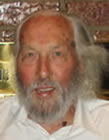
Quick-witted, and with an indomitable (and sometimes wicked) sense of humour, Robert was also the ultimate romantic and Gayle brought out the poet and cheek in him. Right up until the time of his death, Robert penned many, many romantic poems for Gayle, enough to fill a book. He worshipped her, and the fire of his love for her never dimmed.
Gayle reciprocated fully, not with poetry, but with deep commitment and enduring passion. They shared their life, filled with zeal, including cycling around Europe with three of Gayle’s sons in 1979. Gayle also visited Cundeelee with Robert on numerous occasions. Her devotion shone in the twilight years of Robert’s life, as he suffered several heart attacks, lung and kidney problems and other health issues.
Gayle and Robert moved back to Oklahoma in 1985, where Robert resumed lecturing at variously universities and they engaged in extensive travels.
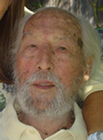
When his health began to seriously deteriorate, Robert retired, but he never gave up. He embraced every ounce of joy from his time on this earth, and gave back a whole lot more joy to others. His body was gradually failing, but his sharp mind, spirit, and sense of humour and romance never waned.
During his retirement he wrote two superb books about the confluence of Aboriginal and white Australian cultures: a novel Kaapi Yalta - Cool Water, the story of a white girl saved and brought up by Aborigines, which he said was written in a state of immersion in the timeless Everywhen of the Dreaming; and a semi-biographical novel of his life with the aborigines, Everywhen at Cundeelee.
Robert spent the last year of his life preparing those two books for publication, plus a book of his poems, Keeping Love Alive and Other Poems and a short book of wisdoms for his great-grandson, Aubrey Robert Sweet, named after him, which he titled Dirt From Our Ears, Mud From Our Eyes.
The final book, Everywhen at Cundeelee, was completed, published and distributed via Amazon.com just before Christmas 2011. Robert passed away two weeks later on 4 January 2012, having held a copy of the book in his hands and having exhausted all his remaining energy to ensure that his life purpose was complete and the beauty of Aboriginal culture and spiritual life will be available for all to read.
He died at home, content and at peace, with his beloved wife, Gayle, by his side.
© 2013 Robigayle LLC
In honour of the Wangkayi community at Cundeelee
Thank you to the State Library of Western Australia for the use of donated photos